The Importance of Bees
For my second blog post I wanted to talk about the importance of bees to humans and other species of plants and wildlife. I'm going to be honest; I hate bees with a passion. I freak out every time I see one because I hate being stung. If you think about it though they are one of the most valuable species on this earth. Bees are the most important pollinator in the world and without them we would be deprived of many of our flowers, crops, and even some species of animals. Us humans can be negatively affected due to a lot of the food we eat are pollinated by bees. In recent years some bees have been on a steady decline and we need to do our part in helping their population stay healthy. If bees went extinct it would be a chain reaction of negative impacts on a number of different plants, animals, and humans.
Pollinators such as bees, birds, bats, and butterflies are essential to the reproduction of nearly eighty five percent of the world's flowering plants (Tangley 2016). The most important of these pollinators being the bees. Bees need large quantities of nectar and pollen to rear their young so they are visiting flowers regularly in large numbers to obtain these nutrients. Since the nectar and pollen can stick to their hairy bodies and as they travel from flower to flower, they can spread pollen pretty easily. Their size also lets them extract pollen from nearly any flower they choose. Bees are also needed to produce more than one third of all foods and beverages humans consume (Tangley 2016). In the United States alone, native bees contribute at least three billion dollars a year to the farm economy (Vaughn 2016). If the bees keep declining that would be a huge loss to the farming industry.
Disease and parasites are a big threat to bees. One of the most detrimental honey bee parasite is the Varroa Destructor Mite. This parasite has already nearly eliminated wild honey bee populations in the United States. These mites can even transmit secondary diseases such as the deformed wing disease. These have increased annual hive losses and raised beekeeping costs. We need to create a pesticide that can kill these parasites but also not harm the bees to where they might be killed. American and European foulbrood is a bacterial disease found in bees and can kill them if untreated. The larvae eat the bacteria and the bacteria then develops in the larvae's gut. Antibiotics can help the bees but there's no guarantee it can stop the spread of the disease. Fortunately researchers are making headway into finding a cure.
We need to help and support bees in anyway we can. Here are a few ways you can help. You can provide pollen and nectar for food. From early spring to late fall bees need these nutrients to help them survive and to feed their young. Ensure bees have nesting sites by keeping an area untouched with all their needs. You could also build and place bee houses around your property. Another important thing you can do is to eliminate pesticides completely. Avoid insecticides which kill bees directly and avoid using herbicides which kill the plants bees depend on. If you really enjoy bees and want to help, you can assist scientists by studying bees. You can report the bee activity around your home to help scientists collect more data.
Bees are very important pollinators and are very important to the ecosystem as a whole. They are very important to us as well. They provide a lot for us by pollinating crops we can eat. I know a lot of people think bees are pests and I myself thought the same thing. Now after researching what bees do and how important they are, I have a new mindset when it comes to bees. I hope after reading my blog post your mind is changed as well.
Sources:
National Wildlife Federation. [NWF] 2016. NWF homepage. https://www.nwf.org/News-and-Magazines/National-Wildlife/Animals/Archives/2016/Bees.aspx. Accessed. April 27 2017.
U.S. Fish and Wildlife Service [USFWS]. 2017. Pollinators. https://www.fws.gov/pollinators/ Accessed April 27 2017.
Pictures:
https://sowswell.files.wordpress.com/2012/07/backyard-beehive-and-starter-kit.jpeg
http://txbeeinspection.tamu.edu/files/2014/10/Adult-bee-with-varroa-mites.jpg
https://pi.tedcdn.com/r/pf.tedcdn.com/images/playlists/why_we_need_bees_1200x627.jpg?c=1050%2C550&w=1050
http://rvcoutdoors.com/wp-content/uploads/2016/07/bees-on-yellow-flowers.jpg




I liked that fact that you recognized the importance of bees, while still hating them with a passion.
ReplyDelete